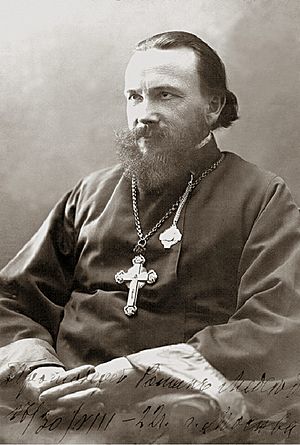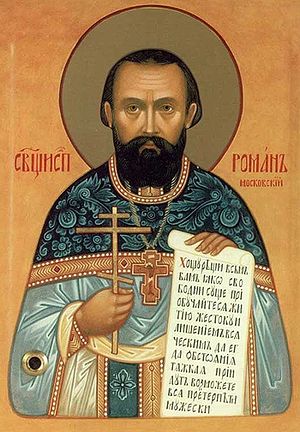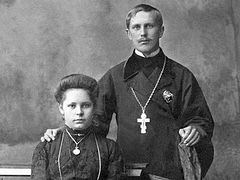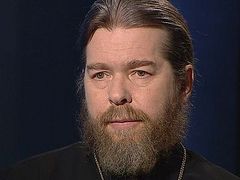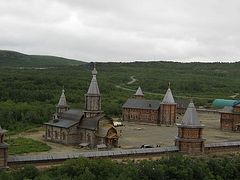On September 8, 1937, the Hieroconfessor Roman Medved reposed. Pravoslavie.ru (Orthochristian.com) presents a selection of quotes from letters written by him in prison, in which are revealed his courage, self-denial, and the committing of his whole life into the Hands of God.
Hiero-confessor Roman Medved1 was born in the year 1874. From 1907, he served as a priest in Sevastopol2, spiritually caring for the sailors of the Black Sea Fleet. In 1918, Father Roman moved to Moscow, and was soon appointed the rector of the (now destroyed) Church of the Holy Hierarch Alexiy on Glinishchevskiy lane. Since then, for more than 10 years, the main mission of his life was the creation of a church community and the spiritual care of Muscovites.
In the church where Father Roman served, there were divine services held every day, and there were even services at night! A brotherhood3 was created named for Holy Hierarch Alexiy, whose members provided for the entire life of the parish. Discussions were arranged on the Holy Scriptures. Father Roman practiced the repetition of the baptismal vows—the renunciation of satan and the joining to Christ—which for the majority of the people were given in baptism via their godparents, and therefore not always well perceived. Members of the community often became priests and monastics. Righteous Saint Alexei Mechev, when visiting the parish of Father Roman said: “You have an in-patient hospital, whereas I have only an out-patient ambulatory!”
The attitude towards the Soviet authorities at the parish was considered loyal4. Despite this, Father Roman was arrested and sentenced to ten years in prison. He was released in 1936, being seriously ill, and settled in the city of Maloyaroslavets.
In the year 1937, when Father Roman was already nearing death, they wanted to arrest him again. Father Roman’s wife, pointing to her seriously ill husband told the NKVD Officers, “Well, take him, it would be even easier for me—I wouldn’t have to bury him.”5 The NKVD officers left with the words “There are enough dead men there.”
In August, Father Roman was tonsured a riassophore monk with the name Joseph. On the eighth of September, 1937, he reposed in the Lord.
The Hieroconfessor Roman was glorified [canonized] at the Bishops Council in the year 2000. His relics were found, and are now venerated in the Moscow church of the Protection of the Most Holy Theotokos on Lyshchikovoy Hill.6
Quotes
We must live in such a way, that we consider every new day to be the last day of our life (awaiting death), or rather the first (in the movement towards perfection).
***
We are here in this life as wanderers,7 and therefore, we should not be upset by the temporary difficulties of the path. It is still necessary to strive, but our Fatherland is in heaven.
***
Renunciation of one’s will is the first condition for the move towards perfection.
***
I have no discontent with anyone here, I am pleased with everyone. If I have a complaint it is only against myself, and I constantly demand from myself the continuous striving towards perfection.
***
From around the ages of twenty to twenty-four, I consciously began to respect every person, and my whole life I was afraid to make someone my servant, and outwardly and inwardly I am afraid to inflict on anyone pain or force them. It’s my job to convince and reassure; I cannot compel. I dare say I loved my freedom, and never made anyone a slave, and I think that is why I value the freedom of others. Let them live according to their own mind and conscience, and I try not to judge anyone.
***
The most difficult conditions here on earth are incomparable to the terrible agony of hell.
***
God cannot be taken away from me by any place, person, or conditions. And if He is with me, than what are these external burdens to me?!
***
More and more often, I remember the words of John Chrysostom and Basil the Great about how in prayers, we should not ask for tiny things, but instead dare to pray for the great things, as well as for unceasing prayer.
***
Among people there are no enemies; enemies cannot exist among us!8 There are only unfortunate brothers, deserving of great regret and help, even when they (due to a misunderstanding), became our enemies and fight against us.
***
We have one common enemy—and this is the devil and his evil spirits. A human, no matter how low he falls, never looses at least a few sparks of light and beautiful-goodness9 that can be blown and gathered into a bright flame. It’s not to our benefit to fight with people—not only if they strike us on the right cheek, but even if they constantly shower us with all kinds of attacks and reproaches10.
***
A person with an impure heart is not able to correctly perceive his surrounding circumstances and tell of them, and so he involuntarily, against his will perverts reality, and against his desire is constantly both a liar and a slanderer.
***
True love can only exist where the heart is freed from passions.
***
The Omnipresent and All-Pervading [God] never abandons us, and cannot abandon us in any circumstances or in any experiences. If this is never forgotten, then our happiness on earth is assured even in serious illnesses and in death itself.
***
If in freedom I did not have enough detailed obedience and self-denial in small things, now these conditions are abundant.
***
Reproach and grounding are very welcome. All this teaches patience, humility, and obedience—and from these everything becomes ever more tranquil and serene11.
***
Blessed is he who has tempered himself, having accustomed himself to a stark and severe life: little sleep, hunger, cold and all kinds of deprivations. When facing a change in external conditions for the worse, he will keep calm. Also well served is he who learns the sacred texts by memory; in the absence of books, he will resort to memory and recite what he needs.
***
All around me it’s noisy, but in my heart it’s quiet, for wherever I am, and whatever the circumstances, I have with me My Only Sweetest Christ.
***
The conditions of this world constantly remind us that we are wanderers in this life, who must be ready at every moment to move from our place, and get to our home, which is beyond the borders of this life.
***
But to all of you living in freedom, I would like to say how important it is to accustom yourself to a harsh life and all kinds of deprivations, so that when difficult circumstances come, you will endure it all with courage and complete self-control.
***
Feelings, feelings—how they ruin us if they are not in completed submission to the reasonable mind12. When your strength burns out, you can see how much they are expended in vain… Feelings are a fire of the soul, and it’s necessary to keep them only for the Most Important One, and to learn to be calm, almost indifferent to everything else.
***
From my very arrival in the [labor] camp in 1931, I kiss my bonds and know that they are to my advantage13.
***
After all, the whole secret of life is in that everything should be done, not according to my petty will or my pitiful little mind. The Only Wise and Good Will must reign in everything, and our job is to not prevent it from being carried out both in us, and through us.

